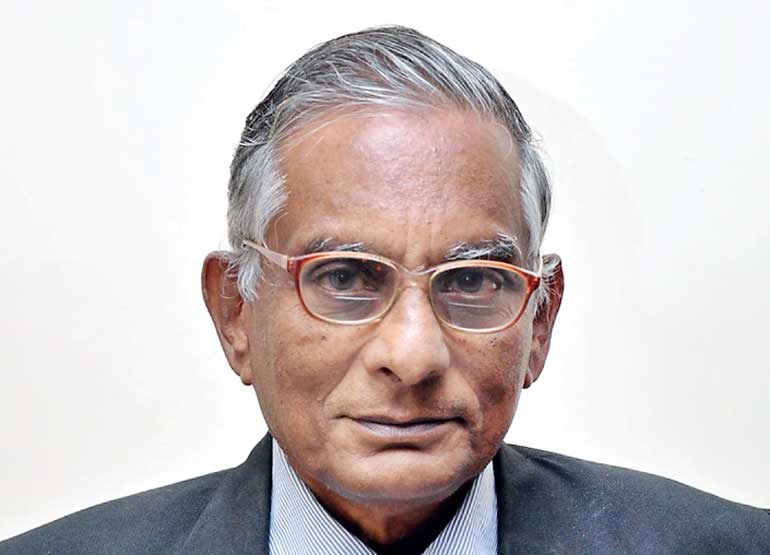Tuesday Feb 24, 2026
Tuesday Feb 24, 2026
Tuesday, 22 November 2016 00:03 - - {{hitsCtrl.values.hits}}
The Budget 2017 speech proposed to establish a Tax Ombudsman by an Act of Parliament to resolve grievances of the taxpayers with a view to increasing taxpayers’ confidence in the tax system. This is a commendable proposal in the 2017 Budget speech along with the proposal to establish a ‘National Tax Council’ that would herald an improved tax administration and better tax policymaking process in the country.
 Former High Court Judge Maxwell Paranagama was appointed as the first and the only holder of the office of Tax Ombudsman in Sri Lanka
Former High Court Judge Maxwell Paranagama was appointed as the first and the only holder of the office of Tax Ombudsman in Sri Lanka
Over 120 democracies have adopted the institution of Ombudsman since Sweden, the first country in the world to establish the institution in 1809. The Swedish word “ombuds” means “officer” or “spokesman” or “representative”. The Oxford Dictionary defines ‘Ombudsman’ as a “Government official whose job is to examine and report on complaints made by ordinary people about the government or Public Authorities”.
In Sri Lanka out of the two types of Ombudsmen, the Public Ombudsman was established by Article 156 of the 1978 Constitution. Financial Ombudsman and Insurance Ombudsman are Private Ombudsmen functioning in Sri Lanka.
Voluntary buy-in of the tax system by the taxpayers is one of the key elements of an efficient and effective tax administration. Where taxpayers lack confidence in the equity and fairness of the tax system, the taxpayers justify in their minds the evasion of tax and non-compliance or resorting to other dubious methods of avoiding their tax obligations to the State and society at large.
The causes that lead to frustration and Loss of confidence of taxpayers in the tax administration are manifold. Inordinate delays in issuing tax refunds, the requests for information on expiry of unreasonable span of time, undiplomatic and arbitrary conduct by revenue officers, adopting coercive measures to collect taxes are examples in point.
Tax Ombudsman would provide an expeditious, free and fair avenue for taxpayers aggrieved by actions of revenue officers to resolve their disputes. The taxpayers could seek assistance of the Tax Ombudsman with regard to service, procedural and administrative tax matters. However interpretation of technical tax matters would not be in the domain of the Tax Ombudsman. The availability of an opportunity to resolve matters amicably would ensure avoidance of protracted litigation.
The concept of Tax Ombudsman was emphasised in the November 2004 Budget speech by then incumbent Minister of Finance and was established on 15 September 2005 as former High Court Judge Maxwell Paranagama was appointed as the first and the only holder of the office. The administrative framework and operational guidelines pertaining to the Tax Ombudsman mandated the appointment to be a period of two years. No successor was appointed pursuant to the completion of the tenure after the first Ombudsman, hence the office was led in to abeyance.
The drawback of the previous Tax Ombudsman was the failure to create the office by an Act of Parliament. It was a mere appointment by the Cabinet sans any legal framework. It was evinced that the previous Tax Ombudsman did not have sufficient teeth to action its findings and the succession of the office was not provided for due to lack of an underlying legal framework.
Hence it is vital that the office of the Tax Ombudsman be created via an Act of Parliament as mentioned in the Budget speech. It could either be a distinct Statute or a chapter in the proposed new Tax Administration Act. The power to appoint, tenure, jurisdiction and powers of the tax ombudsman, the procedure for making complaints and the charge for filing an application, time duration for completion and the power to make directions to Commissioner General of Inland Revenue, the periodical reporting requirements by the Tax Ombudsman, etc. may be stipulated in the governing law.
A salient feature of the draft proposed Customs Act is the inclusion of a Customs Ombudsman under the name Additional Director General of Customs (Dispute Resolution and Public Grievances).
Upon enactment of the new customs Act and the implementation of the budget proposal pertaining to Tax Ombudsman , both tax and customs regime would have respective Ombudsmen to resolve grievances pertaining service deliveries, which augurs well for good governance.
Complaints to the ombudsman could be made on following grounds inter alia. Delay on issue of refunds, non-acknowledgment of letters or documents, taxpayer registration, release of seized books of accounts, impolite behaviour by officers, etc.
The Duties of the Ombudsman should include maintenance of confidentiality, protection of the rights of the taxpayers, adherence to reporting requirements to be specified in the Statute including reporting to the Ministry of Finance, review of activities of the office of Ombudsman, compiling periodical performance review reports of the Ombudsman to the Ministry of Finance, etc.
In designing, drafting the law and setting up the new office of Tax Ombudsman, the authorities may look into framework adopted  and experience in countries such as United Kingdom, South Africa, Pakistan, Canada, etc.
and experience in countries such as United Kingdom, South Africa, Pakistan, Canada, etc.
In Pakistan, Federal Tax Ombudsman Ordinance of 2000 governs institution and appointment is under the hand of the President. Within 60 days of lodging of a complaint, the Ombudsman is obliged to communicate his findings and recommendations to the Revenue Division, who in turn is bound to report on remedial action taken within the time stipulated.
The South African Tax Ombudsman has been constituted by the Tax Administration Act of 2011 while the tax ombudsman office was set up in 2013. The Tax Ombudsman is appointed by the Minister of Finance and is accountable to the Minister of Finance.
The key responsibilities of South African Tax Ombudsman Office has been identified as ‘to maintain a balance between Revenue Authorities’ powers and duties, on the one hand, and taxpayer rights and obligations on the other. Achieving this balance will enhance the degree of equity and fairness in tax administration and improve taxpayers’ perception of the country’s tax system as being fair and equitable. International experience shows that taxpayers are then more inclined to fully and voluntarily comply with their tax obligations’.
The Governor in Council appoints Canadian Tax Ombudsman with a three-year tenure in Canada. Canadian Tax Ombudsman’s mandate is to assist, advise and inform the about any matter relating to services provided to a taxpayer by the tax office.
The Indian Tax System consists of Income Tax Ombudsman and many Indirect Tax Ombudsman.
In conclusion, whilst emphasising that the acknowledgment of the need for a Tax Ombudsman as a salient proposal in the Budget speech, its implementation would be eagerly awaited by the taxpaying community. Commissioning of drafting the law to create ‘Tax Ombudsman’ would be the first task of the process, to be followed by the selection and appointment of the first Ombudsman and allocation of resources for the setting up of the office.
A transparent process is vital and hearings before the Tax Ombudsman should be in camera and the Ombudsman should be duty bound to preserve the confidentiality. An appointment by the Minister with requisite statutory powers, resources to discharge duties and responsibilities is a sine qua non. The implementation of the proposal within six months would demonstrate the commitment of the Government to safe guard the rights of the taxpayers.